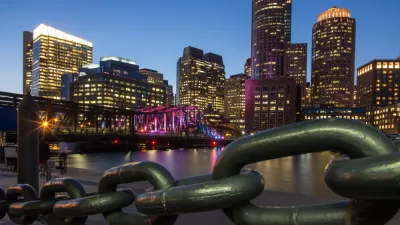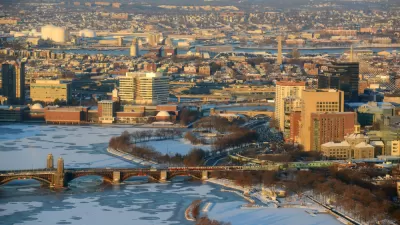It's going to take a lot of funding to build the infrastructure to protect coastal cities from rising seas as climate change takes hold. The city of Boston is starting to experiment with revenue sources that can fund the necessary improvements.

Boston planners are pushing a Climate Resiliency Fund to leverage private development in locations like the city-owned Raymond L. Flynn Marine Park in Seaport for the funding necessary to build protections from rising seas.
According to an article by Andy Rosen, the Climate Resilience Fund is and experiment in infrastructure funding: "asking developers eager to build in the park to help finance a sea wall and other defenses that will protect not just their glimmering new towers of lab space but also the remnants of maritime industry that still operate there."
The Boston Planning & Development Agency is leaning on private sector developers, reports Rosen, to help generate the $124 million needed to construct "the most urgently needed protections for a 191-acre area that in its current state could be prone to flooding as soon as the 2030s and could be largely under water at high tide by the end of the century."
The Climate Resiliency Fund works similarly to how the city "requires commercial developers to contribute a set amount to affordable housing funds, or often to pay for park space or infrastructure upgrades near their projects," according to Rosen.
For more on the city's efforts to prepare for the rising seas of climate change, visit the Climate Ready Boston website, launched on August 9, 2021, lists several initiatives for climate resilience, without mentioning the Climate Resiliency Fund. Rosen's coverage of the Climate Resiliency Fund was published before news that Boston Mayor Kim Janey was rescinding support for the Downtown Harbor Plan championed by the previous mayoral administration.
FULL STORY: Boston is asking developers to help fund a sea wall as the city worries about rising water

Alabama: Trump Terminates Settlements for Black Communities Harmed By Raw Sewage
Trump deemed the landmark civil rights agreement “illegal DEI and environmental justice policy.”

Planetizen Federal Action Tracker
A weekly monitor of how Trump’s orders and actions are impacting planners and planning in America.

The 120 Year Old Tiny Home Villages That Sheltered San Francisco’s Earthquake Refugees
More than a century ago, San Francisco mobilized to house thousands of residents displaced by the 1906 earthquake. Could their strategy offer a model for the present?

Ken Jennings Launches Transit Web Series
The Jeopardy champ wants you to ride public transit.

BLM To Rescind Public Lands Rule
The change will downgrade conservation, once again putting federal land at risk for mining and other extractive uses.

Indy Neighborhood Group Builds Temporary Multi-Use Path
Community members, aided in part by funding from the city, repurposed a vehicle lane to create a protected bike and pedestrian path for the summer season.
Urban Design for Planners 1: Software Tools
This six-course series explores essential urban design concepts using open source software and equips planners with the tools they need to participate fully in the urban design process.
Planning for Universal Design
Learn the tools for implementing Universal Design in planning regulations.
Clanton & Associates, Inc.
Jessamine County Fiscal Court
Institute for Housing and Urban Development Studies (IHS)
City of Grandview
Harvard GSD Executive Education
Toledo-Lucas County Plan Commissions
Salt Lake City
NYU Wagner Graduate School of Public Service





























